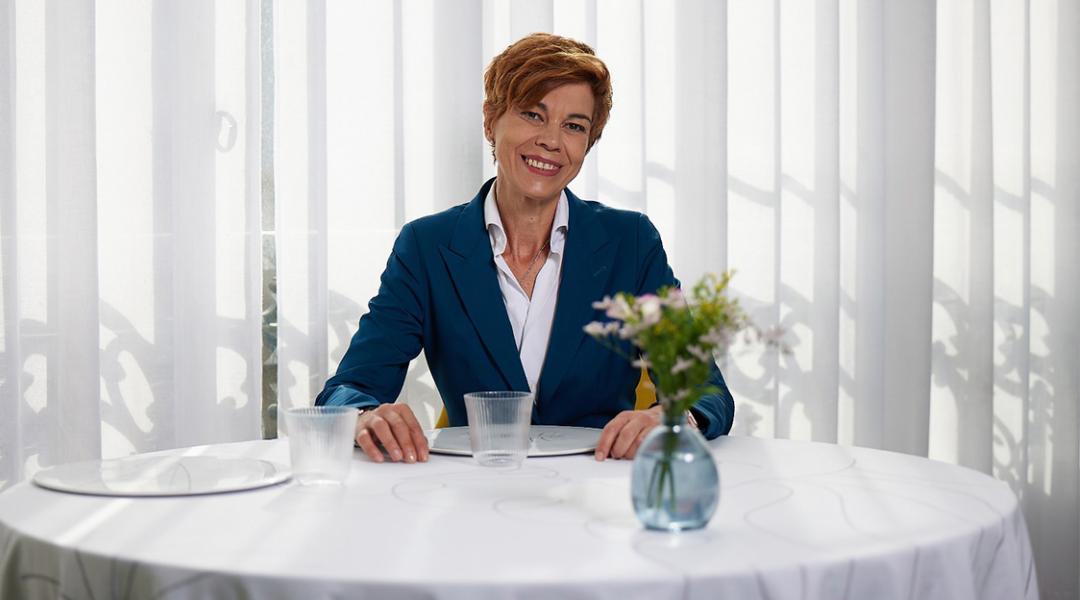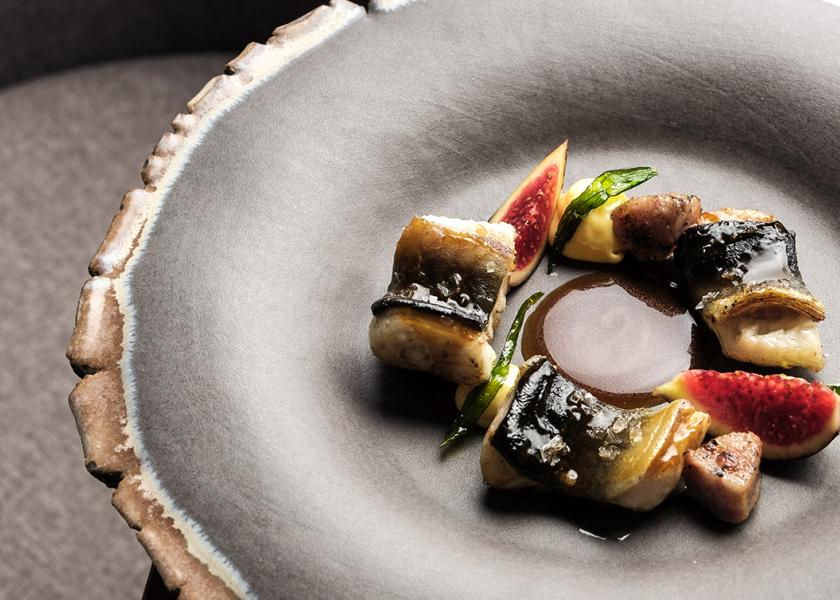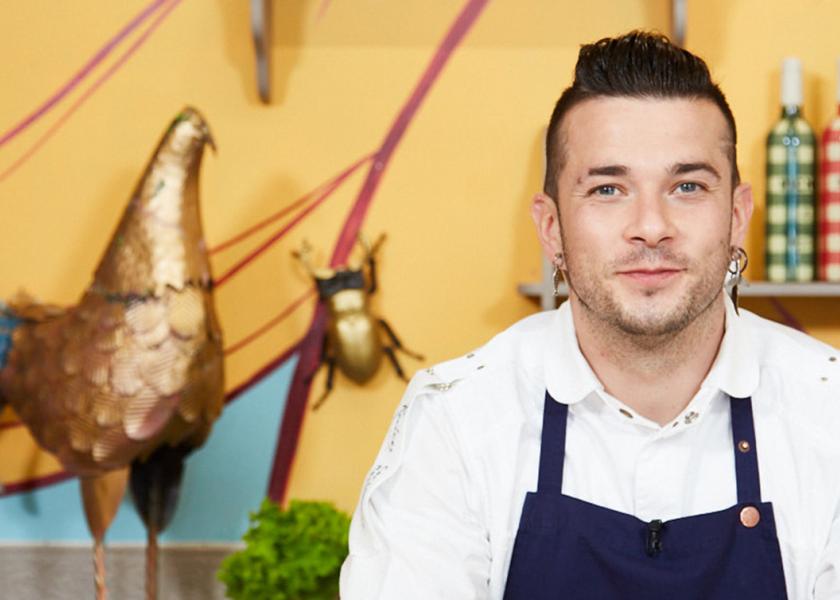Sara Fort
The good hostess

Sara Fort, the winner of the 2023 Spanish National Gastronomy Award for Best Dining Room Management, has a shining career spanning 25 years. The current dining room manager of Paco Roncero Restaurante assures us that receiving your diners with a warm smile and making them feel at home are the keys to being a good host.
Dining room management is a precise dance that, if executed correctly, should go completely unnoticed. The smallest mistake can alter the rhythm of a well-rehearsed choreography that involves all members of the team, from the dining room to the kitchen, from booking management to dish presentation at the table. There’s a reason and, above all, a purpose behind each movement: the diner. They are the centre of everything. Sara Fort (Roses, 1971) is the choreographer of this dance. The current dining room manager of Paco Roncero restaurant, with two Michelin stars, knows that making a good first impression is everything and assures us that approaching customers with a smile always improves any situation. Fort is a natural people person and this makes her the perfect hostess. Whether at the bookshop she used to work at before starting out in this industry, or after co-founding La Broche —where she learnt this trade from scratch—, she carries that energy deep inside that wants you to, above all, enjoy the experience.
This year, the Spanish Royal Academy of Gastronomy has highlighted the importance of her career with the greatest recognition in her discipline, the National Gastronomy Award for Best Dining Room Management. Fort is considered a true pioneer of introducing a more friendly, modern and dynamic style to the dining room, far removed from the rigidity that used to take precedence in this sector. She tells us that her aim is to “provide the service I would like to receive.” The good hostess that makes you feel at home.
For those unfamiliar with this discipline, what is dining room management and how important is it within a restaurant?
Dining room management plays an important role, it’s the set of gears that must work from top to bottom, that is, from booking management or team coordination to the strict supervision of all diner allergies or intolerances, special requests from customers, keeping the team updated on any changes to dishes...It’s important to brief everyone before each service, to make sure everything is under control: tables, cutlery, bathrooms, lighting... If any of these elements fail, even if it may seem insignificant, it destabilises the team and it can break their concentration.
How did you start out? Was it pure passion or chance?
You could say that it came down to love or pure chance, because I’d never worked in this world before. My previous job had been as the manager of a bookshop, but my then-husband, Sergi Arola, needed somebody trustworthy to be a buffer between the kitchen and the dining room, so he suggested it to me. I learnt from scratch, going over glasses, cutlery, setting or serving tables alongside the small team that we had. I owe everything I learnt to them.
“People want friendliness and to feel at ease. For me, the best tip someone can leave me is coming back to the restaurant”
How do you create that bond with your dinner guests when they come to your home, that is, your restaurant, to create a space where they trust your judgement and recommendations?
I believe smiling is always essential. I always tell my team that, if a mistake is made, to deal with it with a smile because there’s a greater chance of solving it more easily. Also, if you share any kind of information, you should do so in a sincere, transparent and convincing way. You can’t approach a table without knowing what you’re going to say or with hesitation, that’s how people lose trust and it could be considered unprofessional.
Which would you say are the main skills you need to be a dining room manager?
There are many, but I consider the following to be essential: being a good host, being patient and responsible, and being a problem-solver.
Is there room for creativity or is it a field where other factors take precedence?
You can always innovate, from setting the tables to how you finish the dish in front of the diner. Customers always expect to be surprised with something different to what other restaurants offer them, however, it’s not easy because we all want to innovate. In the dining room, we always try to work hand in hand with the kitchen, so that the way a dish is finished or presented to customers is truly unique.

Fort’s more informal style in the dining room has been pioneering . © Paco Roncero Restaurante
You’ve been a true pioneer of introducing a more informal and friendly style to the dining room; how did this idea come about? How was this paradigm shift perceived within the world of gastronomy?
It came about organically; my only thought was: “I want to provide the service I would like to receive.” That’s the way I work. I guess people want friendliness and to feel at ease. For me, the best tip someone can leave me is coming back to the restaurant.
What role does the rest of the team play in your work? Do you believe talent grows when it connects?
I think it’s really important to connect with the team as a whole, but also individually with each member of the team. When I started doing this job, I spoke to all the members of the team so they’d tell me what they thought of the service and how to improve it. It’s important that each of them shares their approach to things, that’s how many positive ideas come about and it encourages us all to feel more involved.
This year, you’ve won the Spanish National Gastronomy Award for Best Dining Room Management; what does this mean to you?
In 2005, I already received an honourable mention from these awards and that made me happy, but this one is, without a doubt, the greatest recognition we can receive in this profession. I reap the daily rewards from the customers who appreciate the service they receive, but winning an award of this category fills me with pride.
“I reap the daily rewards from the customers who appreciate the service they receive, but winning an award of this category fills me with pride”
After this recognition, is the responsibility greater?
Not necessarily. I’ve always been a very disciplined person, with or without an award. The good part about receiving it is that it gives you, and your entire team, a boost to carry on. It makes you think: “We’re not doing that bad.”
What is talent for Sara Fort?
For me, talent is an innate gift that you’re able to excel at without even realising it. Nevertheless, you need to work on it every day because each dinner guest is different and requires unique treatment. In my case, I do what I love and what amuses me, I enjoy myself every day. I always say that, in this world, you learn something new daily. This makes it more fun; you never get bored. I guess what has helped me the most throughout my career is dealing with customers face-to-face, this has allowed me to come into contact with all sorts of customers.
“In this world, you learn something new daily. This makes it more fun; you never get bored”
Do you have any hidden talents that you also apply to your work?
I’d say that, more than a talent, I have the virtue of being a calm and very patient person. It’s really important to keep calm in complicated situations. If the customer perceives you as a calm person, it will probably make it easier to solve a potential conflict with them. Always with a calming voice and a smile.
Where do you think the future of dining room management is heading?
I believe that, as well as eating well, customers want a friendly but respectful service. Discrete and effective. They want to feel at home and have a nice time. In my opinion, the key is to use common sense and understand what each diner wants when they come to your restaurant, to your home.


